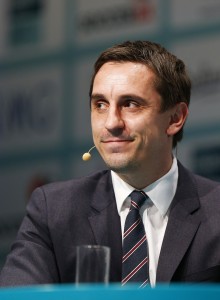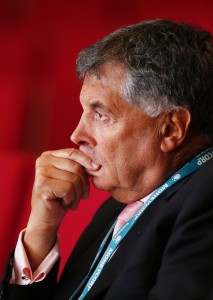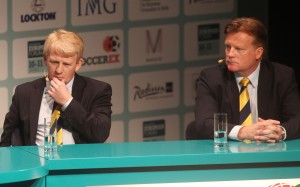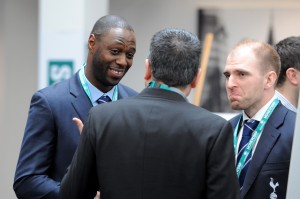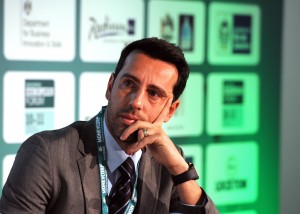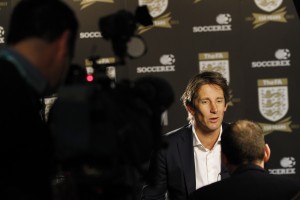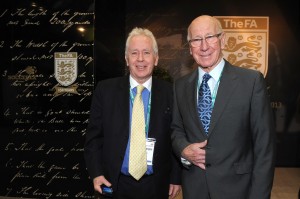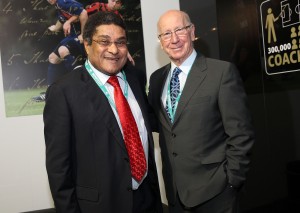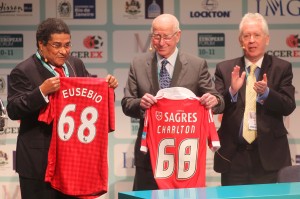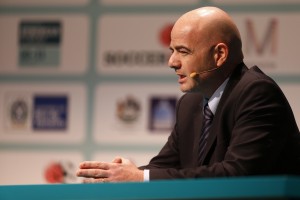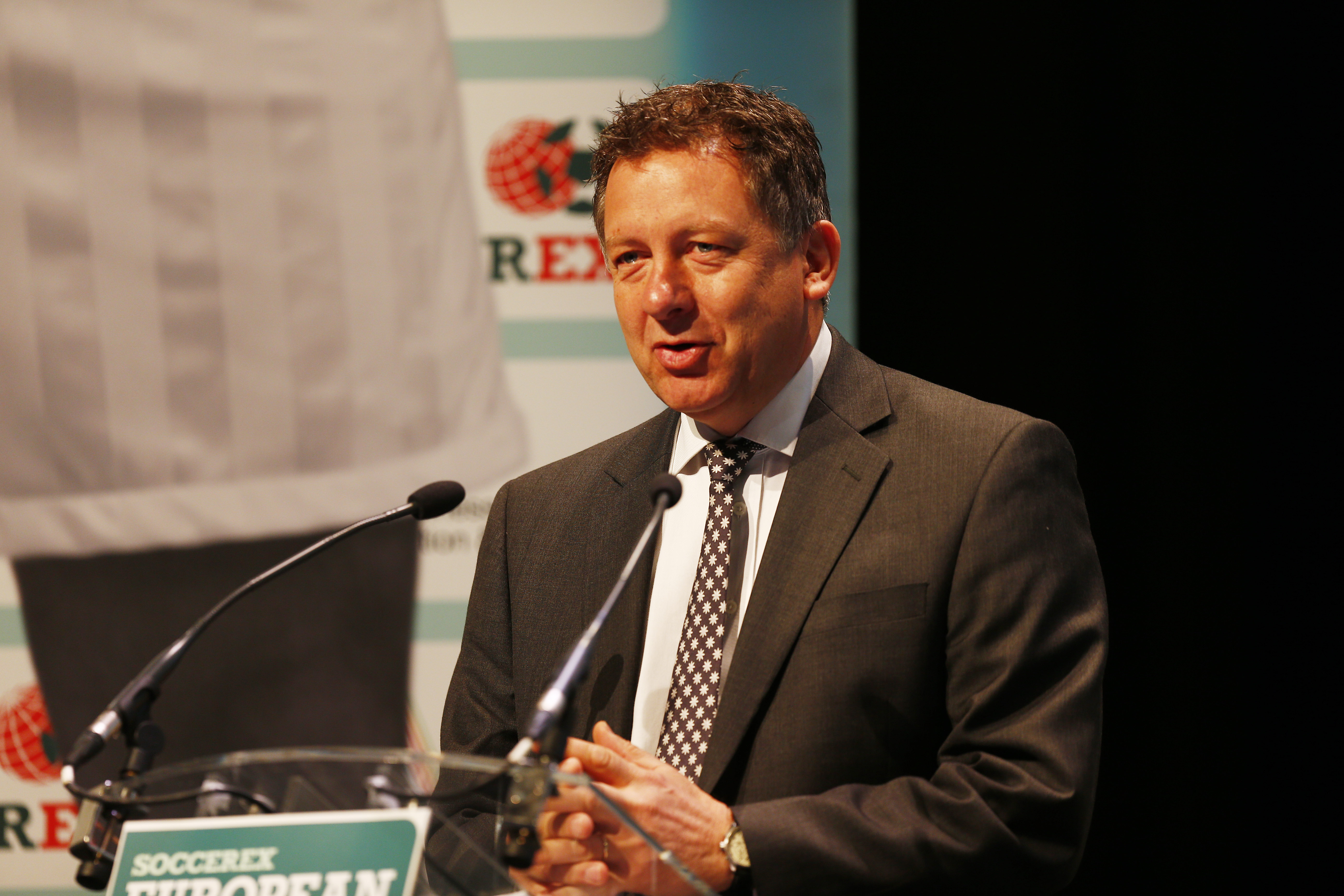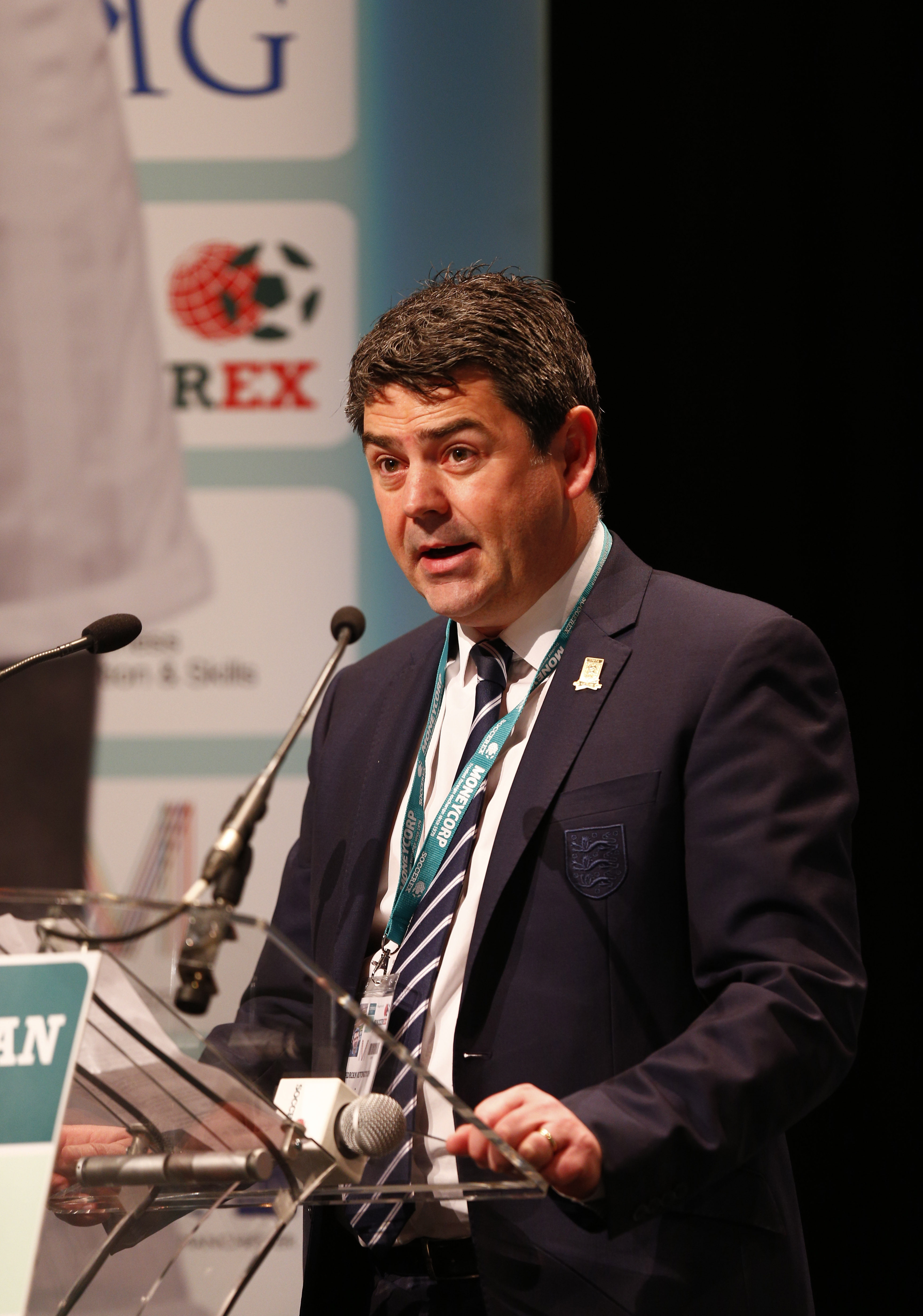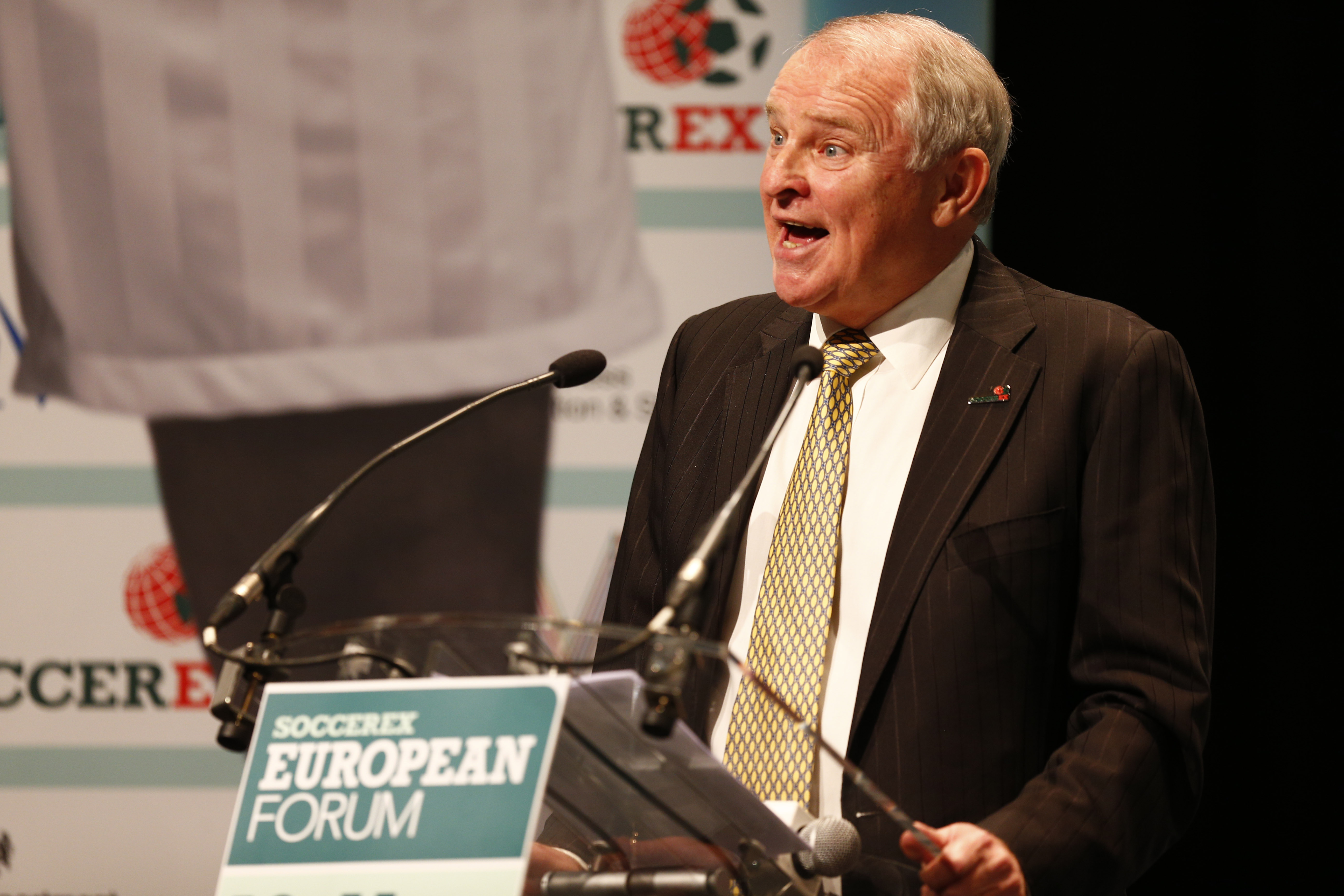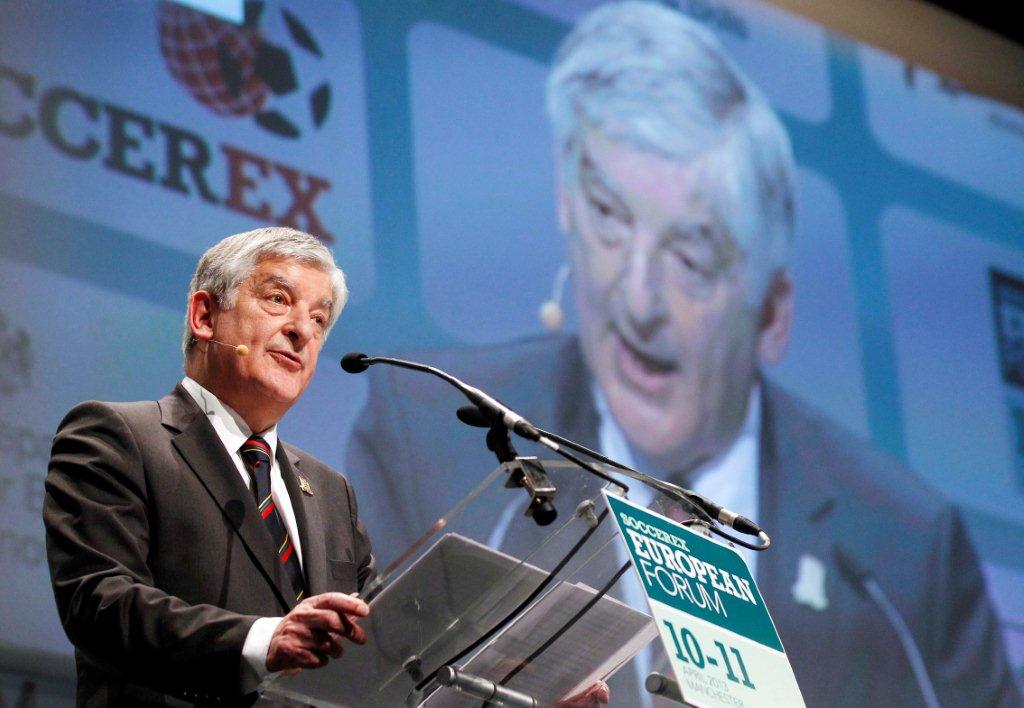Soccerex European Forum (Manchester): The Four Lions
Day 2 – Thursday 11 April 2013
15:15 – 16:15 The Four Lions
– Roy Hodgson, England National Team Manager
– Bryan Robson, England Legend
– Kevin Keegan, England Legend
– Michael Owen, England Legend
– Moderator: Hayley McQueen, Presenter, Sky Sports

The opening question of the session from Hayley McQueen was to Michael Owen and asked whether his impending retirement felt real. He replied that he knew before Christmas that he was going to call it quits at the end of this season and added that every week was one game closer to retiring. Owen added that he was surprised how emotional he was when he made the announcement and was sure it would be equally emotional after the last game of the season. Bryan Robson asked Michael Owen if he planned to stay in football. He replied that he had a few things he was involved with, such as punditry work, doing his coaching badges and setting up a management company to look after young players. McQueen asked if Kevin Keegan had any advice about retirement. He responded that Michael Owen was lucky that he was in a position to decide when to end his career, as others didn’t have that luxury. Keegan added though that he believed Michael Owen could have carried on playing in midfield, as he had done a few times at Newcastle. However, Keegan added that ultimately there was nothing that could replace playing.
Moving on, Hayley McQueen asked about the significance of the introduction of ‘Goal-line’ technology to the Premier League. Roy Hodgson said that everyone wants it and it had to be right that injustice when goals were not given was corrected. However, he added that not all countries and their leagues would be able to afford it. Hodgson did wonder if it would lead to further technology being used. Bryan Robson picked up on this point and said that the technology may only be decisive on 2 or 3 goals a season, whereas how many occasions are there are close penalty calls and so reasoned should technology be used to look at these incidents. Roy Hodgson added that back in the 70s and 80s handball shouts were few and far between, but said that in some games he had watched recently there were 10 or 12 appeals for handball. He added did we want to stop a game on that many occasions whilst a decision was viewed ‘upstairs’.
The next topic for discussion was in relation to the new UEFA regulations for dealing with racism. Roy Hodgson replied that the ‘new’ UEFA stance was much needed. However, he was concerned that although CCTV was in grounds in countries such as England, Spain and Germany, there were numerous others without the technology which would make identifying troublemakers difficult. Hodgson continued that he was concerned that the small minority who go looking for trouble could bring about the closure of a whole ground and make the majority suffer. Bryan Robson said that he wholeheartedly supported UEFA’s efforts to improve the situation, but didn’t believe racism could be 100% eradicated.

Hayley McQueen next asked Kevin Keegan about the stresses of being an England manager. He replied that dealing with the press was always a difficult one. Keegan added it was like facing an over in cricket. The first ball up would be a friendly one you could hit for a four or six, as would the second and third ball, but you knew that sooner or later a beamer and a googly were coming! Keegan continued that as England manager you had a Press Officer who would prepare the responses, but you had to be careful and make sure you answered the questions properly. He went onto say that it was difficult going to games as England manager and remembers going to Highbury to watch Arsenal against Chelsea and only having one English player to watch, whereas the French National Coach was able to watch eleven players. Keegan said that would be okay if he was then able to go to watch Paris St-Germain against St Etienne and watch six or seven English players. However, he said that he loved working with the players, but it was difficult not having the regular contact and communication with them.
Roy Hodgson was asked if the amount of foreign players in the Premier League hampered the progression of English talent. He responded that clubs had their own agendas and therefore brought in overseas talent in the hope of bringing success, but Hodgson added we just had to deal with it. He continued that it was important to maximise what talent was available and build around senior players, but that invariably youngsters took time to develop and blend in. Bryan Robson joined the debate and said that foreign talent had enhanced the league in terms of the skill they brought and what other players learnt from them. Kevin Keegan said that it was important that England had ‘generals’ in first-team’s and that our own ‘play-makers’ were developed. He continued that at Manchester City, their midfield included David Silva and Javi Garcia, who whilst ‘generals’ for the club, weren’t in the top three for the Spanish National Team. Robson said that in the 70s, there were three or four quality Scottish players at each club. Roy Hodgson came in with the point that we had to be more optimistic. He reflected that 10 or 12 years ago, Spain were not amongst the top World teams, so they embarked on an investigation to look at what needed changing. Now The FA is studying the Spanish to see what they do, that we don’t, whether that be in terms of coaching, club organisation or developing young players.
Hayley McQueen asked Michael Owen whether playing abroad helped his development. He added that English players going abroad is rare, with part of the reason being that the Premier League is so lucrative. Owen continued that when he was younger football was so very different at international level and across Europe. He said that now he thought that the game was broadly similar, so players don’t need to play overseas. Owen added that he enjoyed his time at Real Madrid, although his family struggled, but that he did miss the Premier League whilst he was in Spain.

Roy Hodgson was then questioned as to how optimistic he was about England going to Brazil next summer with a full and fit squad. He said that with clubs going on tours pre, during and post season it made it all the more difficult. Hodgson added that the ‘club v country’ issue is not something confined to England as he encountered it during his time as Swiss National Coach. He continued that be understood the situation from both sides as he had worked as a club manager. Bryan Robson half-joked that Sir Alex Ferguson would have preferred all his players to retire from the international scene! He continued that a club manager has the interests of the team at heart so wants fresh players come the start of a new season and not the problems of tiredness and injuries that the European Championship and the World Cup inevitably bring.
Hayley McQueen asked if England was in a transitional phase. Roy Hodgson replied that we had to be positive. Yes, he added there were clubs where squads were filled with foreign players and so it was a different world now for managers. Hodgson continued that young players have to be playing first-team football, but it was a very difficult situation. Michael Owen added that he had never been stopped from going on international duty, but knew of managers who rather you didn’t. He continued that in recent years the League Cup and FA Cup were used to rest players and queried whether internationals were next. Owen continued that there had to be dialogue about the situation, so that players perhaps only played a half in international friendlies. Kevin Keegan interjected that he saw that as a compromise and generally compromises never worked. Bryan Robson added that compromise was the only way. Roy Hodgson made his view clear when saying that UEFA had detailed certain dates or ‘windows’ when friendly internationals could be played, so there was no excuse for club managers not to be aware of these slots and therefore should be able to plan them in.
Given that England had internationals at Senior level and the summer European Championship at Under 21, Hayley McQueen asked where players who were eligible for the U21s but who had played at Senior level, would be selected. Roy Hodgson said that there were obviously discussions to be had with Stuart Pearce. However, he continued that in his opinion if a player has played consistently at a higher level then they don’t go back down. Hodgson added that he couldn’t understand why clubs denied players the chance to play international football at any level and quoted an instance when there were sixty withdrawals from an England U20s squad prior to a tournament. He said he simply couldn’t see why a club would stop 18/19 year olds being released.

Continuing on this topic, Hayley McQueen wanted to know how important it was for players to progress through the international levels. Michael Owen said that on a personal level he gained enormous benefit playing at various age-group competitions as it prepared him for his later experiences at Senior level. He added that he never had a summer off between the age of 15 and 20. Owen acknowledged that some players can cope physically with these demands at a young age, but he added his body didn’t mature enough until his early 20s. He continued that it was difficult to say whether missing out on some of those tournaments would have helped extend his career. Kevin Keegan said that for him it was important that players sailed through the levels and that as an England manager you wanted an elite group of four or five who progressed quickly to Senior level. Keegan added that Michael Owen had only played one game for the U21s. Roy Hodgson made the point that if a player at 19 was not a key player at a club; he liked to think that international experience at the relevant age group was vital and so enable them to get a break at a later point. Michael Owen wondered whether ‘special’ players should be treated differently. Kevin Keegan said that the age-groups team needed their ‘generals’ to play. Bryan Robson recalled the Under 18 (Mini) World Cup that England won in 1975. He added that along with himself, Glen Hoddle, Alan Curbishley, Ray Wilkins and Peter Barnes all played in the tournament despite the fact that they were playing first-team at their respective clubs. Robson considered that winning the competition provided then a confidence and boost that help progress their careers. Michael Owen said that in Spain they seemed to serve an apprenticeship before moving up. He observed England didn’t have the numbers to do this and instead youngsters found themselves forced up, but asked if there was an ideal model. Roy Hodgson said that it was an interesting debate and that there was no ‘right or wrong’ answer. He added that if you built an early and successful relationship with players, it lasts a life-time, with Dario Gradi being a case in point with the work he had done over the years at Crewe.
Kevin Keegan commentated that when he was a player, if you weren’t playing it felt like a failure. He continued that if you get paid ‘big’ money you had to put in the ‘big’ shifts’. Keegan said it was not right that England players like Gareth Barry and James Milner weren’t regulars at Manchester City. Bryan Robson said that he remembered one season when at WBA where he played over seventy games including many on some terrible pitches. He added that they managed by doing less training and that the top players at clubs were rarely rested. Robson continued that current players have all the advantages of better playing surfaces, diets, training and medical support, yet play nowhere near the amount of games of the past. Roy Hodgson said that he didn’t believe modern players played too much and that we were slightly hood-winked as we ‘took it as read’ that players took part in too many games. In support of his point Hodgson said that from his analysis of the England squad many players only completed 15 -19 full games (in actual minutes) during a season – hardly a situation which causes ‘burn-out’.
Hayley McQueen next asked whether it mattered if England qualified through the Play-offs for the 2014 World Cup. Bryan Robson replied that the aim should always to finish top of the groups and therefore qualify automatically. He continued that you should ‘hammer’ the minnows and not lose to the strongest teams. Robson added that it was still in England’s hands, but that the games at Wembley were now ‘must-wins’ and the young players now have to ‘step-up’. Michael Owen added that coaches and players had improved amongst the ‘smaller’ countries and agreed with Bryan Robson that the games at Wembley have to be won.
Turning to the recent game in Montenegro, McQueen wanted to know how it came to be the proverbial ‘game of two-halves’. Kevin Keegan said that these things happen, in that you go forward in the opening forty five minutes, yet come out after half-time and it’s all so different. He added that it happened in the opposite manner as well and recalled how the two games against Scotland in the Play-Offs for Euro 2000 reflected this. England had been comfortable at Hampden Park winning 2-0, but then lost at Wembley 1-0 and just about hung-on to qualify. Keegan continued though that the important thing was qualify. Roy Hodgson was asked how he fielded criticism. The England manager said that people are entitled to their opinions, but their comments were generally made with the benefit of hindsight. He continued he might be being naïve, but held the belief that the public understood the situation. In terms of the game in Montenegro, he said that as a manager you can’t believe that what happened in the opening half is not continued into the second period and therefore you don’t rush into substitutions. Hodgson reinforced what Kevin Keegan had said in that qualifying is the ‘be-all and end-all’.

Next Hayley McQueen wanted to know about the failure of England when confronted by a penalty shootout. Roy Hodgson was visibly irritated by the question and Kevin Keegan stepped in to provide a response. Keegan said that it was very hard to replicate the match scenario and recalled a story from his days at Liverpool. He remembered how after he had missed a penalty against Burnley that in training a penalty competition was organised. Peter Cormack emerged as the winner and three weeks later at Coventry City, Liverpool were awarded a penalty. Keegan said that Cormack didn’t want to take it and so he had to take it and Keegan missed! Bryan Robson jokingly remarked the best thing to do was not draw! Roy Hodgson then said that they do practice penalties, so they can say they have, but continued that in practice before the Italy game they were ‘flying-in’. Hodgson added that ultimately it was all about composure. He said that Clive Woodward had once said that penalty-taking was a ‘science’; however Hodgson said he wasn’t convinced as good players miss.
Hayley McQueen asked Roy Hodgson as to which was the toughest of the four national teams he has managed. He replied that getting Switzerland to the World Cup in 1994 and getting them to the last sixteen gave him particular pride as the Swiss emerged from a Qualifying Group that contained Italy, Portugal and Scotland. Hodgson added that his time at Finland was also pretty satisfying when they narrowly missed out on qualifying for Euro 2008. He continued that to work at International Level was a privilege and that he enjoyed working with the variety of players. However, Hodgson added that he understood that failure was also part and a reality of the role. He continued that ‘other people’ made the job tougher or easier. Turning to the panel he said that the three ex-players were a tremendous example in terms of the enthusiasm they displayed during their career and that England was lucky to have fans who shared that passion.
The session closed when Roy Hodgson turned interviewer and asked the panel who their football idols were. Kevin Keegan said that for him it was Billy Wright, as he was a ‘small’ guy who went onto be a world-class player. He added that he remembers watching on television Wolves against Honved and being amazed by Wright. For Bryan Robson, he said that Bobby Moore was his idol, a great reader of the game and so smooth in everything that he did. Michael Owen said that as a kid he was an Everton fan and Gary Lineker was the player he looked up to and wanted to be. Roy Hodgson had the final word, saying that for him, his idols were two players who were part of the 1966 England World Cup squad who didn’t get to play – Gerry Byrne and George Eastham.
